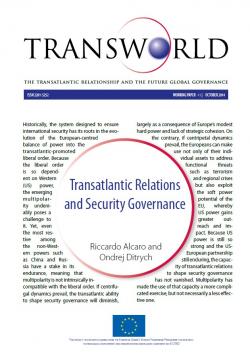Transatlantic Relations and Security Governance
Historically, the system designed to ensure international security has its roots in the evolution of the European-centred balance of power into the transatlantic-promoted liberal order. Because the liberal order is so dependent on Western (US) power, the emerging multipolarity undeniably poses a challenge to it. Yet, even the most restive among the non-Western powers such as China and Russia have a stake in its endurance, meaning that multipolarity is not intrinsically incompatible with the liberal order. If centrifugal dynamics prevail, the transatlantic ability to shape security governance will diminish, largely as a consequence of Europe's modest hard power and lack of strategic cohesion. On the contrary, if centripetal dynamics prevail, the Europeans can make use not only of their individual assets to address functional threats such as terrorism and regional crises but also exploit the soft power potential of the EU, whereby US power gains greater outreach and impact. Because US power is still so strong and the US-European partnership still enduring, the capacity of transatlantic relations to shape security governance has not vanished. Multipolarity has made the use of that capacity a more complicated exercise, but not necessarily a less effective one.
Paper produced within the framework of the IAI project Transworld.
-
Details
Roma, Istituto affari internazionali, October 2014, 26 p. -
Issue
41
Introduction
1. From Continental Balance of Power to a Threshold of Global Hegemony
2. Post-Cold War Governance Architectures
2.1 NATO and the EU
2.2 Multilateral Treaties and Institutions
2.3 Informal Arrangements
3. Transatlantic and Multipolar Challenges to the Liberal Security Order
3.1 The Challenges from Within: Transatlantic Paradoxes
US Power and the Liberal Order
Europe, Multilateralism and US Power
3.2 The Challenge from Without: The Paradox of Multipolarity
4. Transatlantic Relations, Multipolarity and Security Governance
Conclusions
References



